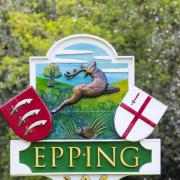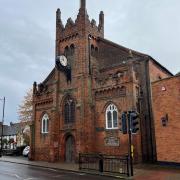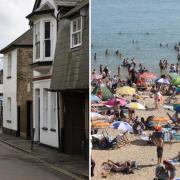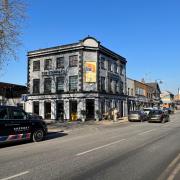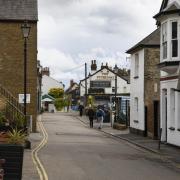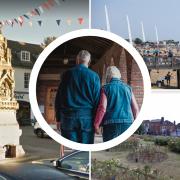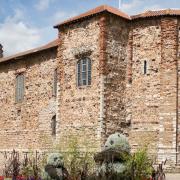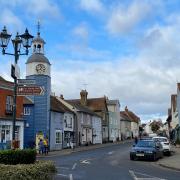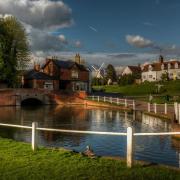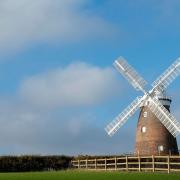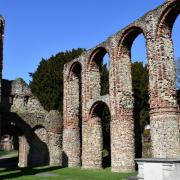Despite its architectural charms, Saffron Walden has a history of innovation and cutting-edge thinking – a tradition its pro-active and dedicated council are keen to maintain, explains Petra Hornsby

Saffron Walden nestles in the Cam Valley and is surrounded by idyllic countryside. The town’s history can be traced back to the Iron Age and there are signs of a Roman fort and settlement on the west side of the river.
Although archaeological finds indicate that the area was once an Anglo-Saxon and Viking settlement, it was probably after the Norman Conquest that the town’s fortunes grew. Geoffrey de Mandeville, first Earl of Essex, built Walden Castle around 1140.
He also founded Walden Abbey and contributed to the relocation of a market from Newport to Walden in 1141. An official charter was granted in 1295 for a Tuesday market, which still operates today along with an additional market day each Saturday.
During medieval times, the town’s main industry was wool and, in the 16th and 17th centuries, the successful cultivation of the Saffron Crocus would give the town its unique name. Good soil and climate were ideal for the plant whose coloured stigma was used in medicines, dye, condiments, perfume and even as an aphrodisiac.

During the 19th century the Quakers had a strong influence on the town and one family, the Gibsons who founded Barclays Bank, funded the construction of some key buildings that are still in use today, including the museum and the Town Hall.
The last census in 2011 put the town’s population at 14,000, but there has since been considerable development meaning today’s figure is closer to 17,000. Saffron Walden’s residents are served well and enthusiastically by its council; so well in fact that last October, the council won an Essex Community Award.
Town Clerk for the council, Lisa Courtney, explains more about the work they do and what earned them the deserved recognition.
Lisa has been the town council’s clerk for the last three years and is one of a team of around 22 staff employed by the council, along with 16 elected councillors.

‘Unusually for a council, we own a number of assets in the town including the Town Hall. The building is let out for private hire but also offered free for use by local residents. At Christmas we hosted a music concert featuring local bands and an orchestra with tickets free for locals.
As a council we recognise that not all people can afford to pay for entertainment during the festive period and it’s good to put on something for all to enjoy.
‘Another public open space that we manage is the award-winning Bridge End Gardens. Two full-time members of staff are employed there and assisted by 20 or so volunteers.
One young volunteer was recently offered a part-time contract with us alongside the NVQ he was following, which demonstrates the value of getting involved in local projects. They are truly beautiful gardens, designed and maintained in a traditional Victorian layout.’

In 2018, the gardens were given a commendation in the UK Heritage Awards and are, in fact, Grade II listed. Sitting east of the gardens are the Anglo-American playing fields, another vital part of public space in the town which serves as a memorial to those killed during the war who were based in the area.
Lisa says: ‘The Anglo-American playing fields were initially funded by the Americans whose forces were stationed nearby during the war. The large space is used by both the cricket and football teams who we charge a nominal rent. The survival and development of these clubs is very important to the town.
‘We also own the common, one of the largest green spaces in the town, which we keep as a common rather than a green. The common is protected, which precludes any development.
‘The town is soon set to benefit from new play equipment for the children, costing in the region of £120,000. As a council, we are creative in our applications for external pots of money to help with the funding of our projects.

‘We are enormously proud of our town market, which we also manage and which has also won its fair share of awards. Last year it won Best Small Outdoor Market and one individual also won Best Young Employee on the Market for their enthusiasm and commitment. Thanks to the award and interest generated by the market’s success, footfall into the town has increased significantly.
‘Footfall was recorded by our Tourist Office in the town using a counter on the door. The office is owned and managed by the council too, with three full-time members of staff employed in the office and supported by a team of volunteers, one of whom has worked in the office for 30 years.
‘That’s dedication! Again, we are proud of the office and what it does, as it is rare these days for a town to have such a facility.’
The council also manages the cemetery and allotments as well as, of course, maintaining all the town’s green spaces through grass cutting, planting, weeding and hedge trimming.

Saffron Walden’s Town Council has also been recognised for its collaboration with the Youth Out Reach Project.
‘Uttlesford District Council offered us funds to work on youth projects – something we were new to – but we managed to match their £10,000 funding with the same amount and, so far, we have had some really positive results. We ask them to tell us what is needed and we will consider funding it.
‘So far we have had a writers’ course, musician courses and a zombie film has even been made! We are looking into setting up a Youth Club in the town in the New Year, something along the traditional lines of a place where young people can meet their friends in a safe environment, with no agenda, just the chance to meet and chat.
‘I think the true essence of a town council is to support people and groups within the community. We are a motivated team of people who want to enable others as well as manage and maintain the attractions of the town, while also upholding its traditions.
‘We marshal events such as Remembrance Sunday – which is especially important to us as Carver Barracks is situated close to the town centre – and we also have a very active British Legion. During the year, we had an Armed Forces Day when the military marched through the town to be inspected by the mayor.
‘It was very popular and the family day which followed the parade (which took place on the common) was also very well attended. We hope to repeat the event this year.’
As if this award-winning town council wasn’t doing enough for the community, the town’s councillors have recently embarked on dementia training after taking advice from the Dementia Action Alliance.
‘Our tourist office has also been declared as being ‘dementia friendly’ as staff members receive specific training to help those with dementia and their families and carers. The tourist office also holds emergency contact information.’
It is not hard to understand why this town’s council has received such positive recognition, which is a rewarding and fitting way to highlight the work that goes into running a successful council.
But it all comes down to the hard work of councillors and committed staff who have a passion for what they do.




